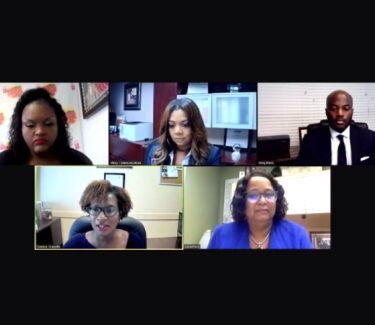Power – And Influence – Of Urban Radio On Display At NABOB Conference
Power – And Influence – Of Urban Radio On Display At NABOB Conference.

As advertising and agency heavyweights convened for the National Association of Black Owned Broadcasters’ Power of Urban Radio conference last week, broadcasters at minority and family-owned companies made the case that just because they’re smaller companies, doesn’t mean they don’t have the ability to influence their local communities.
“Allow us to be creative in reaching our communities in ways that may not be the rollout that you've thought would work across the entire country,” said Geniece Granville, VP/Market Manager for Davis Broadcasting’s Columbus, GA cluster. “It’s hard sometimes to get into those conversations but just give us a little bit of your time. And I think they will be really pleased with some of the creative ideas that we can drive to get impact for their brands and really drive revenue in our local area.”
Given the chance, smaller local operators can surpass the expectations advertisers have for larger groups, the panelists on “The Next Generation of Black Owned Broadcasters” – all members of NABOB’s Futures Committee – seemed to agree. “We know our markets better than anyone else” said Shay Moore, morning co-host at Carter Broadcast Group hip-hop/R&B “Hot 103 Jamz” KPRS (103.3) Kansas City. “We live, we work, we shop, we have families here.”
Velvet Perry, VP/GM of Perry Broadcasting in Augusta, GA, said broadcasters that live in the market they serve enjoy a unique bond with their listeners. “We are community radio, not corporate radio, and there's a big difference,” Perry said. “We are truly engaged daily with our community and they know it.”
It’s A Family Affair
In many cases these stations are family-owned businesses that strive to build a familial work environment for their employees while placing a premium on mentorship. “We see you not only as an employee, but also as a part of our work family,” said Greg Davis Jr., VP/Market Manager for Davis Broadcasting’s Atlanta stations. “We have a very family-oriented company, whether it's our fathers or mothers who are in the company working,” Davis elaborated. “They see everyone here as extended family. And that's a benefit of working with an independent Black-owned broadcaster.”
When you’re a member of the family that owns a broadcast company, the lines between work and personal lives can get a little blurry. For the Davis family, “there are moments where you're sitting at the table, and you're talking about life in general,” said Davis. “And then of course, business falls into play into that. So you never really completely get away from it, you know, because it's just part of your life.” But talking shop during holiday get-togethers is off limits, added Granville. “Okay, Dad, we're gonna talk about something else,” she has to remind her father, Greg Davis Sr., President/CEO of the company. “And he'll say, okay. He's good about Thanksgiving and Christmas.”
Being a second or third generation broadcaster also comes with a fair amount of pressure to maintain and grow the company’s legacy. “You feel pressure, not only just having a seat at the table, but to make sure that you uphold the same legacy that your father has held in the community,” said Alexis Snipe-Campbell, General Manager of Glory Communications. “Because the expectation is that you'll take the bar even higher.”
Like broadcasters of all sizes and ethnicities, Black-owned companies are grappling with how to attract younger listeners to keep their brands relevant in the future. “We've got to bring up this younger generation to appreciate and understand the power of radio,” Granville says. “We've got to be very intentional about it or we're going to end up dating ourselves out. And that's a concern.” And just because personalities and brands have existed and thrived in their markets for years, doesn’t mean there aren’t new generations coming up that aren’t even aware they exist. “We can't assume since we've been here that you all know us,” Granville pointed out. “We have to invite new people in.”

0 Comments:
Post a Comment
Subscribe to Post Comments [Atom]
<< Home